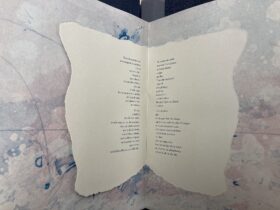April
No days such honored days as these! While yet
Fair Aphrodite reigned, men seeking wide
For some fair thing which should forever bide
On earth, her beautous memory to set
In fitting frame that no age could forget,
Her name in lovely April’s name did hide,
And leave it there, eternally allied
to all the fairest flowers Spring did beget.
And when fair Aphrodite passed from earth,
Her shrines forgotten and her feasts of mirth,
A holier symbol still in seal and sign,
Sweet April took, of kingdom most divine,
When Christ ascended, in the time of birth
Of spring anemones, in Palestine.
This piece is from our featured book Sonnets & Lyrics by Helen Hunt Jackson.
Born in Amherst, Massachusetts, Helen Hunt Jackson was orphaned as a child and raised by her aunt. Jackson was sent to private schools and formed a lasting childhood friendship with Emily Dickinson. Despite a somewhat sporadic education at a series of boarding schools, she was better educated than most women of her time, having exposure to mathematics, science, and philosophy as well as the usual “finishing school” subjects.
Jackson began writing s solace after the early deaths of her husband and two sons and began her career in 1865 with two poems published in the New York Evening Post. Hunt emulated other female writers who had successfully met the requirements of publishers catering to female readers. Carefully adhering to the woman’s sphere of domesticity, she stressed in lyrics, essays, and travel sketches the moral and emotional qualities a woman was expected to possess in her role as exemplar to husband and children.
Once her popularity was established, she added short stories, children’s stories, and novels, published under several pseudonyms but most often simply “H.H.”and published five collections of poetry, including Verses (1870) and Easter Bells (1884), as well as children’s literature and travel books, often using the pseudonyms “H.H.,” “Rip van Winkle,” or “Saxe Holm.”
n 1879, while visiting in Boston, she attended a reception for representatives of the Ponca and Omaha Indian tribes who were touring in an attempt to arouse public indignation over the confiscation of their tribal lands by the U.S. government. Moved by a speech given by Chief Standing Bear, Jackson wrote A Century of Dishonor (1881), an exposé of the rampant crimes against Native Americans, which led to the founding of the Indian Rights Association. Her subsequent appointment to a federal commission investigating the plight of Indians on missions provided material for her 1884 novel, Ramona, a fictionalized account of the plight of Southern California’s dispossessed Mission Indians, inspired by Harriet Beecher Stowe’s Uncle Tom’s Cabin.
To read Sonnets & Lyrics visit Special Collections located on the second floor of Bartle Library. Special Collections also holds other works by Helen Hunt Jackson including Verses and Ramona.







